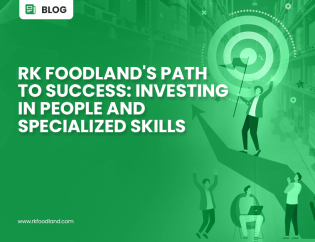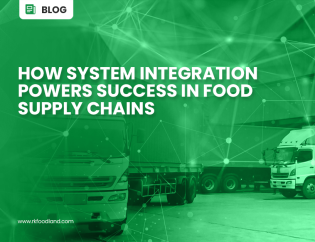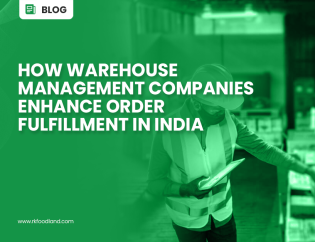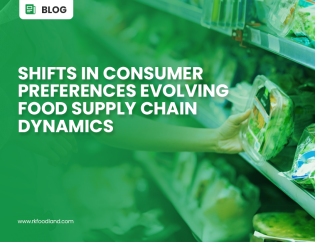
India is now the world’s third-largest startup environment, after the US and China, and development shows no signs of slowing. According to ResearchAndMarkets, the Indian foodtech sector will develop at a CAGR of 39% from 2021 to 2025, reaching INR 1,868.19 Bn. Growing consumer demand for an intriguing new food product necessitates increased production volume. Adding people and equipment to the operations and supply chain can help meet the rising demand. While sales volume increases, supply chain costs increase proportionately. A supply chain architecture that requires constant resource expansion to keep up with sales growth is unsustainable in nature. A scalable supply chain’s objective is to grow capacity while maintaining or improving efficiency, hence lowering supply chain costs per unit.
We have outlined a few ideas for young food brands to build a scalable supply chain. We know from our extensive industry experience that not every entrepreneur wants to grow their business beyond a certain size or reach initially. Supply chain consolidation requires short-term sacrifices to scale the organization. If growth is a priority for the organization, it must commit to scaling, establish a reasonable growth objective, and develop a strategy and action plan to accomplish it.
Standardize and automate processes
While a startup must be agile and innovative, consistent processes help it scale. Standardized processes facilitate automation. Hands-on approaches and manual processes are difficult to scale without extra manpower and infrastructural resources. Standardization is the foundation of a robust supply chain management. Standardization specifies the manner in which a task or group of tasks should be completed. Every task needs scope, quality, and technique standards. For a competitive advantage, these rules can recognize and capture supply chain data using the appropriate tools or technology. With standardization, a part or process may be developed and measured more efficiently, resulting in a more sustainable supply chain that benefits all entrepreneurs. It saves time and money by keeping everyone on the same page.
Automating back-office and operational procedures inside the supply chain is critical to cutting costs, speeding up time-to-market, and fostering innovation. A more technology approach will improve supply chain management, safety, and efficiency. Automating the back office reduces human error and streamlines processes. Modernizing the back office and automating will help reduce stress on people and processes.
Outsourcing
Given the necessity of these procedures, most companies concentrate on product development, fundraising, marketing, and sales. The lack of in-house logistics professionals creates a vacuum and a risk for startups. 74% of logistics leaders anticipate boosting logistics outsourcing spending in the next two years, according to Gartner Inc. A supply chain specialist may assist in filling that gap and acting as an extension of their team, providing the organization with a competitive edge. Outsourcing fulfilment to a 3PL saves initial capital. A startup usually manages fulfilment first to learn about the process and how to optimize it. From the start, a business must be hands-on, from packaging to returns. As the business expands and orders increase, outsourcing fulfilment may be more cost-effective and time-efficient. A supply chain specialist can help startups save money on warehouse space and personnel, source raw materials, move processed foods while maintaining product integrity, and most significantly, can guide startups with their expertise in the Domain.
Expansion
All food startups want to grow their business in a way that is sustainable. A Supply Chain Specialist can help a food startup scale by allowing for business and operational flexibility. Their fulfillment centers allow food entrepreneurs to expand without having to manage and operate their own facilities. A supply chain specialist’s national fulfilment network can also be leveraged to deliver orders as food startups develop new products and versions. A well-defined network allows start-ups to reach remote and potential markets faster. In addition to finding new sales channels, and an established Supply Chain Specialist may help organizations reach a larger consumer base. They can also help a food business better deal with seasonal demand while continually ensuring that the brand’s final product is transported to market in a temperature-controlled environment. A supply chain professional is better positioned to address any issues that arise during the transportation of the finished product.
Collaborative Approach
At the start of a food brand’s growth journey, often they struggle with their volumes due to variations in demand, which can be a cause of concern for them. Transporting low volumes of finished goods through a dedicated carrier can be expensive for a startup. Hence, it is advised for startups to opt for a more collaborative approach, where they can share their resources through supply chain specialists enabling them to transport variable volumes of products to different markets according to their demand. A collaborative approach will also give the food startups information about how a specific market is reacting to a product produced by another food brand, helping them string a better strategy for that specific market. A collaborative approach can save organizations 5-10% on costs and increase revenue by 7-10%, according to a report by McKinsey’s. Collaboration helps food brands to harness the collective intelligence of numerous stakeholders in order to plan and meet consumer demands. This primarily entails the sharing of real-time demand information among supply chain partners.
Supply Chain as a Service (SCaaS)
Investing in the Supply chain as a service module benefits startups by providing them with technology-driven, end-to-end supply chain management solutions. The SCaaS module is expected to grow at a 7.5% CAGR from 2018 to 2025, led by the expansion of mobile devices and internet penetration in emerging markets. This highly adaptable supply chain approach leverages a SCaaS provider’s experience and skills to assume responsibilities for production management, manufacturing, warehousing, inventory tracking, order fulfilment, and transportation. Finally, SCaaS provides the infrastructure and technology necessary to reduce the total value chain costs by offering customizable fulfilment solutions and adopting technology and automation to increase speed, visibility, and accuracy throughout a whole supply chain network.
Around half of startups fail during the first five years of business, according to some estimates. There are numerous reasons for a startup to fail, but the majority of the time it boils down to the fundamentals of excessive spending relative to revenue. Excess operations and supply chain costs can be a significant impediment to profitability in the food sector. Evaluating the scalability plans and engineering a unique supply chain to strengthen the brand’s future plans can be a significant step for ensuring long-term success.
Let us collaborate today and co-create a robust supply chain of tomorrow for your brand!









